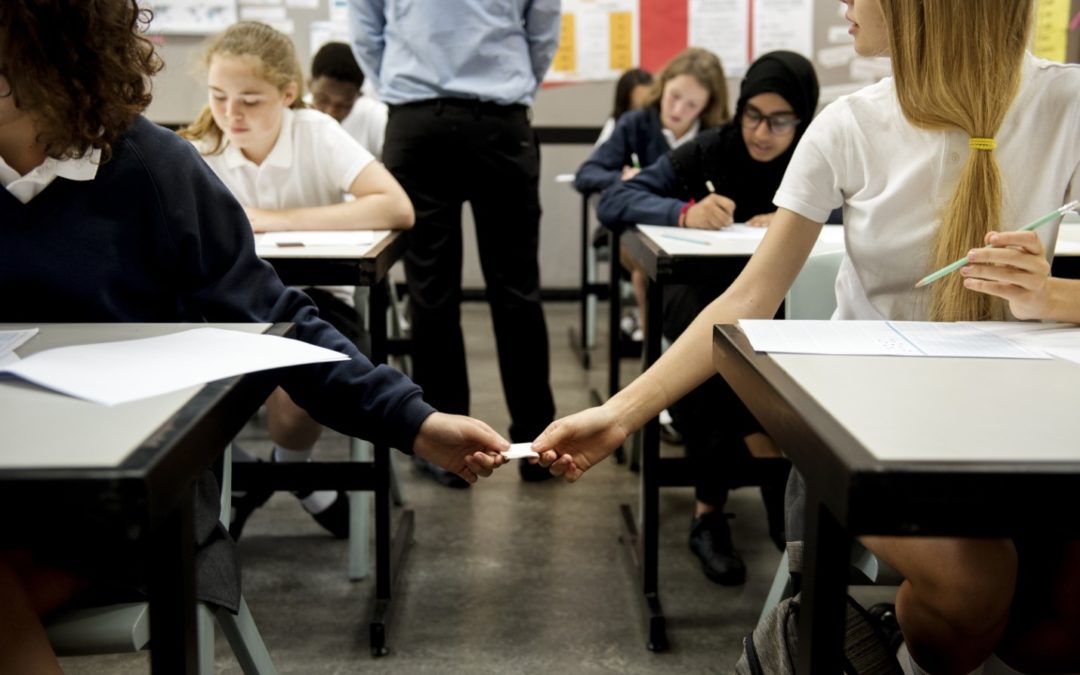If you think back to the days when you were in school, cheating involved trying to sneak a peek at another classmate’s work or test when the teacher had their back turned. Often times, kids were caught because frankly, they aren’t that good at being sneaky when an adult has a watchful eye on them. Fast forward to school these days – whether we are talking traditional school or virtual learning – and it’s a different world!
Students have access to answers literally at their fingertips. A quick search on the internet will yield answers to almost any question that is on your child’s homework, regardless of the subject. Sometimes that can be beneficial as a means to show parents how to tackle certain math problems for example, but other times it can be an enticing way for a student to cheat and copy the answer from someone else.
If your child is completing their schoolwork online, how do you keep a watchful eye on their internet behavior? How do you make sure that they are doing their own work and not just copying answers from an online forum? There are some helpful pointers to keep your kid on the straight and narrow, so let’s get right into it!
Don’t assume they are cheating.
This is a big one in building trust with your child. Just because someone has the ability to take the easy way out, doesn’t mean that they will. Actually, cheating may seem like the easy way out to parents, but it brings a lot of guilt, frustration, disappointment, and shameful feelings to the student. Often times they are cheating because they don’t understand the material and don’t want a failing grade. Assume the best in your child and their behavior until you have reason to believe otherwise.
Talk to your student.
While you don’t want to assume that they are cheating, you also want to keep your eyes open and not be naïve to the fact that they could be faced with this temptation one day. Having the mindset that your child would never cheat instantly puts up a wall in the line of communication. Sit down sometimes and have a chat with your child. Ask them if they know others who have cheated and if they ever feel tempted to do so. By taking a reasonable approach to the conversation, you are letting your child know it is okay to open up to you should they face this choice.
Open up about your experience.
Were you faced with making the decision to cheat when you were in school? Our children open up to us easier if they feel that we have shared experiences. Share that memory with your child and let them know the decision you made. Did you cheat? Let them know. Then discuss how you felt afterwards, which was probably pretty crummy. Did you opt to give it your all instead of cheating off of a friend? Did you surprise yourself and do better than you thought or did you bomb your test? Open up to your child and you might get a lot back in return by simply sharing experiences.
Observe homework and test taking.
Sure, this step can be time consuming for parents, but sometimes it’s needed. If they were in a brick-and-mortar school, a teacher would be overseeing his/her classroom as they complete their math worksheet or take their social studies test, so the same should be done at home. By overseeing their work, you are ensuring that they aren’t flipping from site to site searching for answers but instead are doing the work on their own.
Ask questions.
Sometimes asking a simple question of how they are doing in their studies will give them the chance to tell you if there is something they are struggling with. If they say they don’t understand a particular lesson, jot a message to the teacher asking for additional help or try to assist them in working through their problem together. This will prevent a snowball effect and will keep your student at the top of their game.
On the other hand, should you notice questionable behavior, ask your student to give you a “refresher course.” If you feel that your student may be cheating on their homework, ask them to act like the teacher and teach you what they are learning. If they can’t explain the material they just learned and are acting fishy, then they may be cheating and you should look into it further.
Discuss your expectations.
Does your child feel pressured to keep all A’s? Help your child ease their mind by discussing what expectations you have of them and their grades. Are you fine with A’s and B’s? Is there a certain grade that they have to get before they can advance to the next lesson plan? Are they cheating as a means of not falling behind? Having an open discussion so that everyone is clear of their expectations can help to reduce school related stress and the need to be perfect and outperform.
Students face a lot of tough decisions on a daily basis and you want to make sure that your student is strong enough to stay away from cheating behavior, even if it means taking a poor grade on an assignment or asking for more time so that they understand the material and can complete the assignment/test on their own.
At My Virtual Academy, we work with students in grades 5-12 who are at various levels of academic ability. We are tuition free and provide everything your student needs to be successful! Our friendly staff and amazing teachers are hoping you’ll come on board and join our school! For more information, please visit our website or give us a call at 800-297-2119.


